
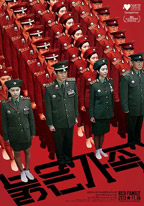
Boog-eun ga-jeok
South Korea 2013
Genre:
Drama
Director:
Lee Joo-hyeong
Cast:
Kim Yoo-mi
Jeong Woo
Son Byeong-ho
Park So-yeong
Park Byeong-eun
Kang Eun-jin
Oh Jae-moo
Kang Do-eun
Song Min-soo
Park Myeong-sin
Lee Jae-goo

Red Family
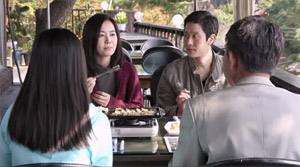
Story: Seung-hye (Kim Yoo-mi) moves into a new home with her husband Jae-hong (Jeong Woo), their daughter Min-ji (Park So-yeong) and grandfather
Myeong-sik (Son Byeong-ho). They are the perfect loveable family and stand in complete contrast to their neighbors, the boy Chang-soo (Oh Jae-moo) and hia father
(Park Byeong-eun) and mother (Kang Eun-jin) as well as his grandmother (Kang Do-eun). Chang-soo's parents are constantly argueing and the boy has to make them
show the appropriate respect at least in front of their neighbors. However, Seung-hye's picture-perfect family consists of North Korean spies. While
they are executing assassinations for their country they more and more find themselves contronted with the concept of life of their neighbors. Min-ji has
aroused the interest of Chang-soo and the grandmother wants to spend more time with Myeong-sik, who keeps it a secret from his superior Seung-hye that he
is critically ill. When Seung-hye finds out that Jae-hong's real wife has tried to flee the North and was captured, she decides on her own to kill someone
with her comrades who is a thorn in the North's side in order to score some points with their superiors and save the life of Jae-hong's wife. But the lives of
the agents start to fall completely apart after that...

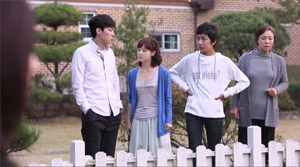
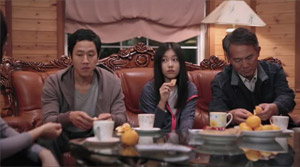

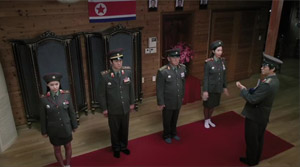
Review: "Red Family" centers around what it means to be a family. This doesn't just include positive aspects, naturally, but if you put a normal
family with all their baggage of problems against a fake one of North Korean spies it becomes clear very soon what value even those persons can have you
maybe don't even like that much. This movie written and produced by Kim Ki-Duk is a deep emotional affair and at the same time is surprisingly entertaining.
Actually, you can't even make out that this film is an art house flick, even though it apparently didn't have that much of a big budget at disposal. This
is because this time there are dialogues in rapid succession and fewer symbols that are silently put into the camera's focus for us to reflect on.
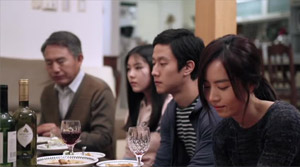
The dialogues stand as one of the strength points of the screenplay as well as one of the weakest aspects. Kim Ki-Duk has never been an exceptional dialogue
writer which probably may be the reason why he, fully aware of that, prefers to make his protagonists remain silent. In "Red Family" the numerous dialogues
are accordingly rather naive. Interestingly enough, this bestows a certain purity upon the subject, as if looking at the North-/South Korea conflict through
the eyes of a child. On the other hand this is also the reason why we can't attest the movie the profoundness of art that characterizes Kim Ki-Duk's other
works where he additionally sat on the director's chair, like "Pieta" or "3-Iron". Instead, the movie turns out
to be astoundingly effective on an emotional level which is displayed particularly well at the end.
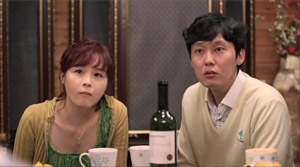
The film's naivity is also apparent in a few scenes like those in which the agents briskly shout "comrade" at each other which obviously the neighbors can't
perceive while we can hear the neighbors' bickering through the thin walls quite well on the other hand. Or what about the scene in which both families sit
at one table and talk about the two country's being seperated? Why North Korean spies, who naturally have to keep their identity a secret at any cost, suddenly
start to defend North Korea and its dictatorship seems to be a little odd, to put it mildly. The level on which they talk about the country's seperation
isn't quite sophisticated either, although a few interesting arguments are made. What's a bit annoying is the fact that the subject isn't really
approached in a subtle manner here.
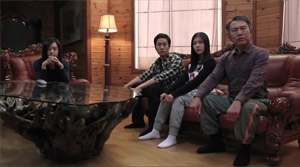
Concerning the characters the film doesn't make it easy to sympathize with its individuals. This is especially true when it comes to Seung-hye, played
by Kim Yoo-mi ("Return"), who makes an incredibly coldhearted impression, but also applies to the other agents who appear to be
merciless because of their ruthless murders. However, slow but steadily the different layers of their dilemma become apparent, after all they can't refuse
an order since their families at home are used to apply pressure, and so we can just pity them for the drama their life consists of. Son Byeong-ho
("I am a Dad") as the grandfather and oldest agent of the group imbues a profound tragical note to the story. Every agent
displays a new aspect of the gruesome life as a North Korean spy and accordingly it's in fact the characters that are responsible for the movie to have
a pleasant pacing all throughout.

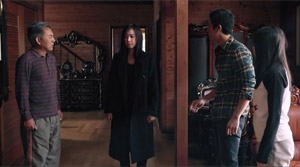
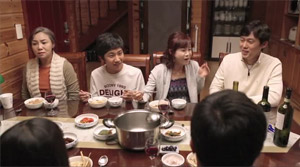

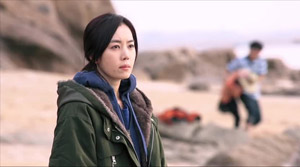
Every now and then there are also a few fights, which may be choreographed quite well, but are captured poorly. There are also a few problems concerning the editing since many scenes are put one after another in a very unrefined manner. But this shouldn't come as a surprise since Kim Ki-Duk was helping with the editing work and his works display a certain roughness around the edges anyway. Which actually can have a certain appeal. Director Lee Joo-hyeong delivers a solid effort in his debut, doesn't create anything extraordinary, but veers away from Kim's art house style and thus makes the movie easier accessable to a bigger audience. A few humoristic scenes or references to Kim's other works, like the song "Arirang" or the movie "Poongsan" which Kim wrote as well and is watched by two agents at the cinema, are used to refine the end product. The not so perfect family may be put against the picture-perfect family in a too caricatural fashion, but all in all "Red Family" turns out to be very effective on an emotional level towards the end and therefore deserves a clear thumbs-up despite the aforementioned flaws.

Disclaimer










